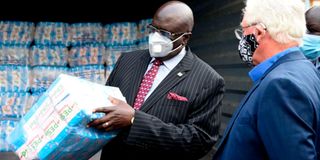For a majority in Kenya, having a period is a luxury

Education Cabinet Secretary Prof George Magoha (left) with M-PESA Foundation Executive Director Les Baille during the handover of sanitary towels to 180,000 needy girls across the country last January.
What you need to know:
- Currently, a packet with seven to 10 pads goes for an average price of Sh80, equivalent to half standard poverty line of $1.90 (Ksh200) per day.
- In remote areas where the reusable pads could be useful, there is no access to water to clean them. So how are the women and girls going to use them?
Ms Mary Akinyi, 44, is a shoe shiner in Nairobi’s central business district, earning an average income of Sh300 daily.
She is raising three grandchildren, one of whom has reached puberty. The granddaughter, in Class Seven, studies at a rural school in Migori County.
Ms Akinyi, says she rarely buys her sanitary towels not out of choice, but because her budget is too constrained to think about pads.
“Sometimes I buy her a packet when I can afford. With the little I get, I must ensure they have adequate food first before I can budget for anything else. For me Sh50 is a lot of money,” she says.
The granny is unaware whether her grand-daughter gets a supply of the pads in school or not. Neither does she know how she manages without.
Ms Akinyi underscores the lives of 4.1 million women in Kenya who live in abject poverty and for them, a packet of sanitary towels is a mere luxury that cannot compete with the immediate needs
Currently, a packet with seven to 10 pads goes for an average price of Sh80, equivalent to half standard poverty line of $1.90 (Ksh200) per day.
In November 2018, nominated Senator Abshiro Halake moved a motion in the Senate calling on the government to zero rate Value Added Tax (VAT) on locally manufactured sanitary towels as well as zero rate duty on raw materials used in making the menstrual products domestically.
“Menstrual health management among women and girls in Kenya has been a major issue particularly for low income earners, with about 65 per cent of women and girls in the country who can barely afford sanitary towels each month,” she argued.
Tax systems
She queried why pads were taxed alongside other luxury items yet menstruation is an involuntary biological function.
“Classifying menstrual hygiene products as luxury items is infringing on the rights of girls and women in this country. It also goes to show how our tax systems are punitive to women,” she said.
For instance, she said, a perforated film and perforated PV top sheet used in making the pads attracts an excise duty of 25 per cent. While a 10 per cent excise duty is pegged on non-woven top sheets.
“Affordable access to menstrual hygiene products is inextricably linked to rights to health, sanitation, education and dignity among other rights,” she said.
Population Action International, Regional Technical Advisor Ms Florence Machio, says while reusable pads serve as an alternative sustainable option, lack of access to clean water complicates their use.
“In remote areas where the reusable pads could be useful, there is no access to water to clean them. So how are the women and girls going to use them?” she wonders.
Only by making the pads cost-friendly will they be accessible to all women and girls, she says.
She recommends pricing them at Sh10, just like a packet of three condoms.
“The way we dispense condoms in public facilities is exactly what should be happening in the case of the sanitary towels,” she says
She underpins reforms in the country’s menstrual hygiene management to having an increased number of women in the decision making arms.
“It is through having more women in positions of decision making that we will have decisions that will make a difference (in menstrual hygiene management),” she argues.
Her argument is evident in the way the government, whose decision makers are predominantly men, has responded to containing Covid-19.
For close to three weeks, the Ministry of Health released non-sex disaggregated data. It is after the Ministry of Public Service and Gender headed by Prof Margaret Kobia raised concern over the need for data identifying the male and women infected, that it started doing so.




